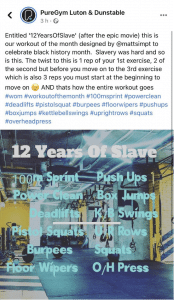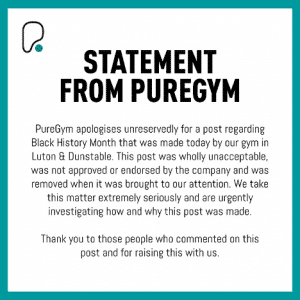How would you feel if your business was accused of racist behaviour for a post you didn’t share? This situation was played out on Instagram (initially) in early October 2020, when a personal fitness instructor shared a new workout that he was launching in the Luton & Dunstable branch of PureGym.
This is the post…
“Entitled ’12YearsOfSlave’ (after the epic movie) this is our workout of the month designed by @MattSimpt to celebrate black history month.”. He added, “Slavery was hard and so is this”.
Whether this was posted during Black History Month (which it was) or not, this is clearly a very ill-judged post and the fall-out was unprecedented for PureGym.
To add some context to this, PureGym has 294 branches across the UK, supporting over 1 million members, and their Luton & Dunstable branch has (at the time of writing) 2,028 followers. Yet, across their main social media channels, PureGym were forced to make this following apology…
The Personal Trainer, Matt Simpson, also took to Instagram to issue this unreserved apology…
View this post on Instagram
What Should Have Happened?
PureGym have 2 clear options.
- Run the social media channels centrally
However, given the number of branches and channels in use, this would require considerable human resource and cost.
- Allow each branch to run their own
Given that each branch positions itself as helping the health of their communities, I believe this is the best option. However, as highlighted above, it comes with challenges.
Those challenges include ensuring those who run the local social media channels have the skill to do so, which means both how to use the channels and how to use social media. Assuming that most people won’t tread the path that Matt Simson chose, even if each branch uses social media to self-promote themselves in an overly sales way, then they’ll struggle to succeed and get any return from whatever channel they use.
In 2017, PureGym wrote a blog about this very topic called “SOCIAL MEDIA AND THE GYM: SHOULD I BE SHARING?”, in which it says:
Of course, the gym was never going to escape the digital era, and an entire industry has grown up around Instagram and YouTube fitness celebs, with many trainees feeling the urge to get a snap of their abs for the world to appreciate.
Question is — should you be sharing?
As good as this article is to highlight, a clear social media policy needs to be created and adhered to for any one organisation that has employees, or third-party individuals or companies, represent themselves on social media.
The purpose of a Social Media Policy is to:
- Explain the new workplace reality
- Protect the company
- Help raise awareness
- Outline what is considered confidential or private information
- Who to refer online questions to?
- Discuss the proper way to engage with others online
- Remove any confusion about legal issues
Action Point
This was a brutal lesson for PureGym and I hope they have been proactive and supportive to ensure this doesn’t happen again.
What about you?
Who runs your social media accounts? How comfortable are you that they truly know what social media is for, what channels to represent your company on, how to engage with your audience, etc? Social media may forgive but certainly does not forget.
If you do not have a policy in place, then now is the time to write one and ensure that everyone is working together to support the needs and goals of the business. If you do have one, then now is the time to review it for exactly the same reasons.
As the late Arsenal and England footballer one said, “Remember who you are, what you are, and who you represent”
If you need support, get in touch.








